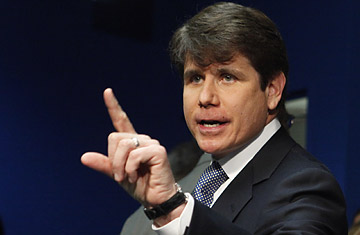
Illinois Governor Rod Blagojevich
With the Illinois House's vote by an overwhelming margin today to impeach Rod Blagojevich, the Illinois governor is assured of having to face at least one trial: in the state senate. But the criminal case against him is also continuing to percolate, if on a delayed schedule.
Today was also the original deadline for an indictment, one that would most likely lay out the charges in greater detail than initially put forth in the 76-page criminal complaint filed by U.S. Attorney Patrick Fitzgerald at Blagojevich's arrest. But four days ago, a federal judge for northern Illinois granted Fitzgerald's request for a 90-day extension. "The ends of justice served by the extension," according to Chief Judge James Holderman, "outweigh the best interests of the public and the defendants to a speedy trial." He set the new deadline for April 7. (See TIME's gallery of politcians outed in scandals.)
In filing the motion for an extension, Fitzgerald revealed that the investigation, begun in 2003, involves many more suspects than the two thus far charged — Blagojevich and his resigned chief of staff John Harris. Reports are surfacing that the probe is widening beyond the governor into the dealings of his brother Robert, who ran his campaign fund. The motion also noted that "thousands of phone calls were intercepted between late-October 2008 and early-December 2008," that confidential witnesses were used as part of the case and that "multiple witnesses have come forward in recent weeks to discuss their knowledge of criminal activity." Holderman, in a separate hearing Monday, ruled that parts of taped conversations can be released to the defense, though redacted by the feds.
And so, in requesting his extension, Fitzgerald seems to have handed Blagojevich lead attorney Edward Genson a good chunk of information to play with before April 7. Just how will Genson and his team defend the governor against the charge that he attempted to sell Barack Obama's Senate seat and other corruption allegations?
John Marshall Law School professor Ronald Smith describes Genson and his team as "verbal elbow throwers" who meticulously strategize and specialize in crafty back-and-forth before the jury. And Genson has already begun throwing elbows. On Thursday, his team asked Holderman to remove Fitzgerald and his entire prosecution crew because of a purported violation of a pretrial publicity order. ("Meritless," said the prosecutors.) Genson has also loudly pushed his claim that the government's case is much ado about nothing. Sure, the governor was heard talking of selling Obama's seat to the highest bidder, talking of getting Chicago Tribune editorialists fired for being too harsh on his administration and talking about trying to put the squeeze on a children's hospital and on the Tribune, which was looking to sell the Cubs with state help. But does mere talk constitute a crime? "Genson can argue it was [just] talk, and absent any act, there's no crime," says Andrea Lyon, a professor of law at DePaul University and former head of the Illinois Association of Criminal Defense Lawyers. "It's a First Amendment issue."
Fitzgerald will undoubtedly argue that the talk itself was a crime. Says Lyon: "The prosecution's position, as I understand it, is the offer to take a bribe or something of value is the completed crime because it's depriving the people of the state of the right to honest service." Such statutes have become broader, allowing lawyers greater reach in how to interpret such talk. "It used to be quid pro quo. That's what people were looking for. Not so anymore." Smith, a former prosecutor who has taught federal criminal law for 15 years, explains: "The question is whether something was promised or something was expected. The courts realize there is a right to give, a constitutional right to support your candidate with money. But now we're into the gray area. When is there an expectation of a reward [for having provided that monetary support]? When does the politician or the donor cross the line? It's not clearly spelled out."
According to legal experts, the crux of the legal arguments may focus on parts of the taped conversations that aren't getting much attention now, dialogue that helps define the nature of all the pay-to-play politics talk. Defense lawyers will argue that politics is politics and that you can't hold someone criminally accountable for playing by the rules of the political game. Genson tried — unsuccessfully — to make the same point at the trial of Lawrence Warner, a co-defendant of Illinois' disgraced and incarcerated ex-governor George Ryan.
Smith suggests that Genson will probably try to get the jury to parse not just the words but what was intended by a conversation. "Who knows what's going on in somebody's mind when they say certain things?" says Smith. "But a jury is permitted to get into their minds and make a finding." Such a strategy would characterize Blagojevich and his co-defendants as experienced political operators who "made it to the top of the game; they're not losers. But one day they woke up to find out the rules had changed, and they can't believe that they've committed a crime."
Whatever the defense strategy, the trial is likely to be good theater. Genson and Fitzgerald have already been trading jabs in the legal back-and-forth during the impeachment proceedings and in the run-up to the indictment. They are playing to an audience that extends far beyond a potential jury pool, says Jack Doppelt, a lawyer, investigative journalist and professor at Northwestern University. All the talk of prosecution and defense what-ifs has an effect on constituents, who in turn talk to their political representatives, who can put pressure on other public officials. And all the talk has an effect on the shape of Fitzgerald's and Genson's strategies. "Everything they do, everything they say, creates a ripple in all these arenas," says Doppelt. "Both sides, every time they make a move or a statement, they reach out to every single one of these audiences."
